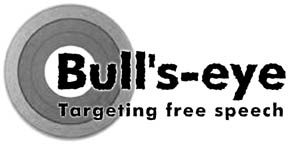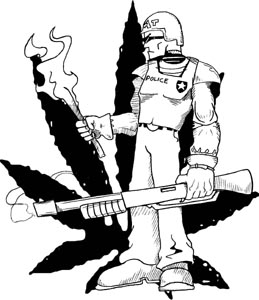IMPACT
press
Feb.-March '00 Articles:
Vowing for Equality:
Same-Sex Marriage
Big Brother &
the Nightly News
Overpriced Musings:
Politicians
Worth Your Vote
Targeting
Free Speech
CIA-Socialism
in Chile
Quickies
(music reviews)
E-Mail Us
Your Comments
Archives
Subscribe to IMPACT
Buy IMPACT T-Shirts
Home |
by Scott Bledsoe
art/Eachean Edmundson
“A growing number of police departments empowered with a litany of zero tolerance laws are targeting those who exercise their free speech rights, especially when it comes to drugs.”
As the debate for drug law reform heats up all across the country, many well-known people are beginning to speak out. Woody Harrelson, Willie Nelson, Donald Trump, William F. Buckley, and even New Mexico Gov. Gary Johnson have been among those criticizing and offering alternatives to the current drug war. Even with these movers and shakers openly advocating a different approach, talking about the drug war can be dangerous business. The biggest faction opposed to drug law reform is law enforcement who, for the most part, are content to ignore activists or quietly oppose them. However, a growing number of police departments empowered with a litany of zero tolerance laws are targeting those who exercise their free speech rights, especially when it comes to drugs. A number of activists have been singled out for no-knock, warrantless, forced entries by paramilitary task forces, ruse traffic stops, and even harassing phone calls by police. Law enforcement will stop at nothing, it seems, to quiet those critical of their handling of drug laws.
In one quite humorous case, Cannabis Action Network founder Kevin Aplin was asked to leave a public park while at a Hemp Rally in Tyler, Texas. This was one in a series of events designed to raise awareness of industrial and recreational uses of marijuana. When police asked Aplin to shut down the rally he refused and police seized a one pound bag of sterilized industrial hemp seeds from his display. The seeds were purchased over the counter in Texas and are legal in the United States. Four months later, Aplin was arrested for felony possession of marijuana at the Hemp Museum in New Orleans. After an exhaustive legal battle, Aplin won the right to not be extradited.
Upon news of his victory, Aplin returned to Texas. He went to the Capitol with hemp seeds taped all over his body and attempted to turn himself in to then-Texas Gov. Ann Richards. With warrant in hand, the capitol police refused to arrest him. A few days later, Aplin was arrested in Tyler, when he turned himself in to local authorities. Aplin was convicted after the DEA testified that Aplin's seeds had sprouted in a laboratory. His conviction was later overturned on appeal because the State of Texas had no procedures for testing seeds. Aplin has been laughing about the case ever since. ''I told them I was indigent, provided receipts for the seeds where they had been purchased legally, yet they spent untold thousands flying in DEA agents trying to convict me,'' said Aplin.
This was a six-year legal battle designed to intimidate and drain the resources of an activist. The prosecutor, Joe Black, even said over objection at the trial, ''Don't give Mr. Aplin a license to come back to this community and preach his message of marijuana legalization.''
In another case, which is not so funny, a letter printed in the New York Times led to one fellow's worst nightmare. ''Mr. Mara'' (name changed to protect identity), a research fellow at the Hoover Institution, wrote a letter to the editor blasting the paper's condemnation of drug law reform efforts.
''Three days later'', says Mara, ''a SWAT Team entered his house using a battering ram at five in the morning.'' According to Mara, they were yelling and screaming, waving automatic rifles, and threatening to shoot his dog if he didn't divulge the location of his stash.
''They handcuffed everyone in the house including my 86-year-old grandmother and began demanding for us to show them the drugs!'' exclaims Mara. When no drugs were found they explained to Mara that he should be more careful with what he writes and consider the consequences of his action in the future. Mara says he has been afraid to even talk about the issues and has decided to simply talk to people one on one.
In yet one more shocking example of this fascist censorship of free speech, well-known author Peter McWilliams has become the center of controversy by simply paying someone for helping him write a book.
McWilliams is the author of several New York Times best sellers including, ''The Personal Computer Book,'' ''How to Survive the Loss of a Love,'' ''How to Heal Depression,'' ''Do It! Let's Get Off Our But's (The Life 101 Series),'' and ''Ain't Nobody's Business If You Do: The Absurdity of Consensual Crimes in Our Free Country.'' McWilliams has appeared on The Oprah Winfrey Show, Larry King (both radio and television), Donahue, and Sally Jessy Raphael. In 1996, Peter was diagnosed with AIDS and non-Hodgkin's lymphoma. When the AIDS drugs and chemotherapy caused McWilliams to suffer extreme nausea, he turned to using medical marijuana. The marijuana ended his nausea and he was able to continue with treatment. His cancer went into remission and his AIDS was undetectable. After that, McWilliams promised he would attempt to help others learn about using marijuana medicinally.
In the fall of 1996, McWilliams met Todd McCormick, who was also a medical marijuana patient and an expert at growing the best strains. Peter commissioned Todd to write ''How to Grow Medical Marijuana.'' In July of 1997, fifty of the DEA's finest stormed McCormick's home to arrest, him for growing marijuana. When Peter learned of the arrest he immediately began a public relations campaign to criticize the DEA's motives. Shortly after, McWilliams was questioned by the DEA. During questioning, they called him a traitor to their cause by producing literature that spoke out against law enforcement and the Vietnam War. They also accused him of financing McCormick's marijuana cultivation.
On July 23, 1999, nineteen days after McWilliams gave a speech at the Libertarian National Convention in Washington, D.C., he was arrested for aiding and abetting the manufacture of a controlled substance and arraigned in federal court. Meanwhile, he is out on bail. The conditions of his bail, however, prevent him from using marijuana. His cancer is back and his AIDS has caused him to become violently ill. McWilliams, someone who has given so much to society, now lies sick and downtrodden, waiting for trial, because he wanted others to learn what he had.
These are just a few examples. I myself have been targeted in my hometown of Jacksonville because I have successfully sued them in federal court three times, with more on the way, for violating my civil rights.
There are always collateral damages in any war. In the drug war, it may very well be the constitutional freedoms guaranteed to us as American citizens that is the first. In our government's quest for the perfect society, it seems they have ignored the clear warnings given us by Orwell, Bradbury, and Hitler. Law enforcement too, seems to have forgotten that they are to protect the rights of all citizens even those critical of current drug policy. As more people speak out against the tyranny created by the overzealous hatred created by the war on drugs, hopefully it will become impossible for the police to single them out.•
Email your feedback on this article to impact-press@mindspring.com.
Other articles by Scott Bledsoe:
Make an IMPACT
|

